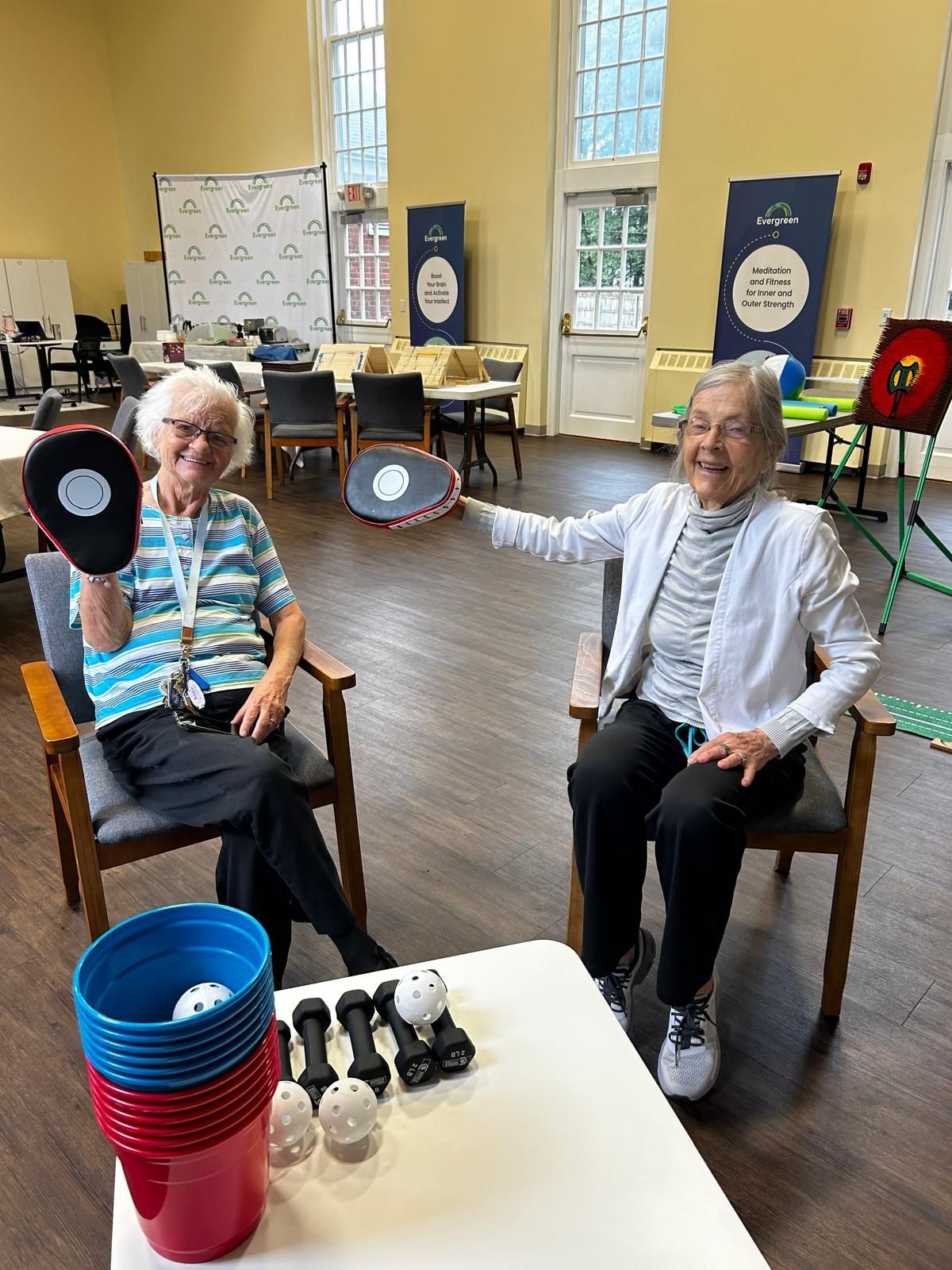Click HERE to RSVP to our Grand Opening on May 15th in Stamford, CT
Questions? Call us: 203-514-7450

Daytime senior programs combine health care and engagement to drive better outcomes
Adult day care is a community-based service designed to provide care and companionship for older adults or individuals with disabilities who require supervision and assistance during the day. Unlike residential long-term care options like nursing homes, adult day care facilities operate during specific hours, typically on weekdays, allowing caregivers the respite they need while ensuring their loved ones are in a safe and nurturing environment.
Types of Adult Day Care
There are several types of adult day care centers which cater to the varying needs and preferences of individuals and families. The common types include:
- Adult Social Day Care: Primarily focuses on providing social activities, meals, recreation, and some health-related services. Ideal for adults who are mostly independent but require some level of supervision and social engagement.
- Adult Day Health Care: Provides a higher level of medical care and therapies. Designed for those with serious medical conditions requiring regular monitoring, including administering medication, wound care, and therapeutic exercises.
- Specialized Adult Day Care: Targets adults with specific needs such as those suffering from Alzheimer’s, dementia, or other severe cognitive impairments. Specialized staff and activities are designed to cater to the unique needs of these individuals.
Adult Day Care Services
Adult day care centers offer a broad spectrum of services that aim to enrich the quality of life for participants while providing respite for caregivers. Services commonly provided include:
- Meal and Snack Services: Nutritious meals and snacks are often provided, with dietary restrictions taken into consideration.
- Health Monitoring: Blood pressure, medication distribution, and other basic medical monitoring services are usually available.
- Therapeutic Services: Physical, occupational, and speech therapy sessions can be part of the care program.
- Recreational Activities: Social events, games, crafts, and outings are organized to keep adults engaged and mentally stimulated.
- Educational Programs: Some centers offer educational activities like computer training, book clubs, and language lessons.
- Personal Care: Assistance with activities of daily living such as grooming, bathing, and toileting may be provided.
- Transportation: Pick-up and drop-off services are sometimes included as part of the package.
Choosing an adult day care center is a significant decision that can greatly benefit both the individual requiring care and their family. The right setting not only offers a safe and caring environment but also provides valuable socialization and stimulating activities that contribute to the individual’s overall well-being. Given the different types of adult day care and the varied services offered, there is likely an option that suits your specific needs.
When to Consider Adult Day Care?
The decision to explore adult day care options often comes at a crucial juncture for families and caregivers. While the need may vary from person to person, there are several indicators that it might be time to consider this form of care. For example, you might observe that the individual requiring care is experiencing social isolation, showing signs of deteriorating physical or mental health, or is in need of specialized care that can't be provided at home. Likewise, caregivers often feel overwhelmed or unable to manage the demanding task of constant care, which can negatively affect their own health and well-being.
Benefits of Adult Day Care
Considering adult day care can come with multiple benefits that improve the quality of life for both the individual and their family caregivers. Some of these advantages include:
- Reduced Risk of Falls: One of the major concerns for older adults or those with physical impairments is the risk of falling when left alone. Adult day care centers are staffed with trained professionals and equipped with fall-prevention measures, reducing this risk significantly.
- Enhanced Sleep Quality: A well-structured day that includes physical activities, social engagement, and mental stimulation can lead to better sleep quality for participants. A good night's sleep is crucial for overall health, particularly in older adults and those with chronic health conditions.
- Reduced Caregiver Stress: Providing constant care for a loved one is rewarding but can also be physically and emotionally draining. Adult day care offers respite for caregivers, allowing them time to recharge, work, or attend to other responsibilities. This can greatly reduce stress and improve the overall quality of the caregiving.
- Socialization Opportunities: Many older adults experience loneliness and social isolation, which can lead to depression and cognitive decline. Adult day care provides a community setting where participants can engage with their peers, make new friends, and take part in group activities that they find enjoyable and stimulating.
- Comprehensive Health Monitoring: Regular health checks, medication management, and the availability of medical professionals ensure that the individual's health is closely monitored. This is particularly beneficial for those with chronic illnesses that require constant observation.
Recognizing the signs that adult day care may be beneficial can sometimes be challenging, but the payoffs in terms of improved quality of life for both the individual and their caregivers can be considerable. By offering a safe, stimulating, and supervised environment, adult day care centers can be a win-win solution for everyone involved. Whether the need stems from medical necessity, the desire for social interaction, or simply the need for a break in the caregiving routine, adult day care is an option worth considering.
Who Should Consider Adult Day Care?
The question of who should consider adult day care is a critical one, as the answer may vary depending on individual circumstances and needs. Often misconceived as a "one-size-fits-all" solution, adult day care actually offers a range of services tailored to different groups of people. Below are some categories of individuals who can particularly benefit from the resources that adult day care centers provide.
Older Adults with Cognitive Impairments
One of the most common groups benefiting from adult day care are older adults with cognitive impairments such as Alzheimer’s disease or other forms of dementia. These conditions often require a level of care and supervision that may be difficult to provide at home. Specialized adult day care centers are equipped with staff trained in cognitive behavioral techniques and can provide safe environments for individuals to interact and engage in activities designed to stimulate mental health. Structured programs can slow cognitive decline and offer much-needed respite for family caregivers.
Homebound Seniors Seeking Social Interaction
Another group that can benefit significantly from adult day care includes seniors who are homebound and lack social interactions. Social isolation can lead to a myriad of health issues, both physical and mental. Adult day care centers offer the perfect platform for seniors to interact with their peers in a safe and supervised setting. Apart from providing companionship, these centers often also offer a range of physical activities tailored to the needs and abilities of the elderly. These can range from simple exercises to more engaging activities like dancing or gardening, helping to keep seniors physically active and mentally engaged.
Family Caregivers with Daytime Obligations
Adult day care is not only beneficial for those in need of care but also offers an invaluable service for family caregivers. Many caregivers have full-time jobs or other daytime commitments that make it impossible for them to provide constant care. For these individuals, adult day care centers serve as a secure environment where they can leave their loved ones while tending to other responsibilities. Additionally, caregiving can often become a 24/7 job, leading to caregiver burnout. Adult day care services can provide these caregivers with the break they need to recharge, making them more effective in their caregiving roles when they are with their loved ones.
How Much Does Adult Day Care Cost?
The cost of adult day care is a key factor that many families consider when looking for suitable options. Although adult day care is generally more affordable than full-time residential care, the expenses can still be significant, and they vary widely depending on several factors. Understanding these can help you make an informed decision.
Variable Costs Based on Services and Location
One of the primary determinants of cost is the type of services provided. Centers that offer specialized medical care, therapeutic services, or cognitive stimulation programs typically charge more than those providing basic supervision and social activities. Additionally, the location of the adult day care center also impacts the cost. Centers in urban areas or regions with a higher cost of living usually have higher fees compared to those in rural areas or regions with a lower cost of living.
Federal and state reimbursements can also influence the cost of adult day care. Some centers may participate in programs that receive federal or state funding, allowing them to offer subsidized rates to qualifying individuals. These programs often have specific eligibility criteria that must be met, such as income limits or certain medical conditions.
Private Day Care Models
Besides publicly-funded options, there are also private adult day care models that operate independently of federal or state reimbursement programs. These centers may offer more luxurious amenities or specialized programs, such as art therapy or outings to cultural events. As they are not subsidized by government funds, they generally charge higher rates. Their pay structures may include flat daily rates, weekly or monthly packages, or even à la carte pricing for specific services.
Is Adult Day Care Covered by Insurance?
Navigating the landscape of insurance coverage for adult day care can be complex. While adult day care offers a range of services beneficial to both the individual requiring care and their caregivers, it's important to note that these costs are usually not covered by Medicare.
However, there are some exceptions and alternative routes for financial assistance. For example, some state Medicaid programs may offer reimbursement for adult day care services, especially if the individual has a medical condition that requires specialized care. Eligibility and coverage vary by state, so consulting with your local Medicaid office to understand your specific options is advisable.
Another potential source of financial support is the Adult Day Health Care program offered by the U.S. Department of Veterans Affairs. This program is designed for veterans who need skilled services, case management, and assistance with activities of daily living. It may cover the costs of adult day health care, making it a valuable resource for eligible veterans and their families.
Finding and Evaluating Programs
Finding the right adult day care center that fits your needs or those of your loved one is a critical task. A good starting point to find programs in your area is by using the National Adult Day Services Association's (NADSA) searchable directory, where you can enter your zip code for local listings. Another useful resource is your local Area Agency on Aging, which can be located via the federal government’s Eldercare Locator or by calling 800-677-1116.
Once you identify potential centers, it's essential to ask a series of questions to evaluate if they are the right fit.
Questions you may want to consider around adult day care:
- How long has the center been in operation? A longer operational history often indicates experience and reliability.
- What licenses, certifications, and accreditation does it have? These affirm that the center meets certain quality standards.
- What’s the ratio of staff to attendees? A lower ratio is generally better, as it ensures more individualized attention.
- What kind of training do employees receive? This can indicate the quality of care and services provided.
- What days and hours is it open? Knowing the schedule can help you plan your own availability accordingly.
- What’s the policy on late arrivals or pickups if you won’t be using transit services that the center provides? This is crucial if you're responsible for transportation.
- Does it offer physical, occupational, and speech therapy? Availability of these services can be important if your loved one has specific medical needs.
- Does it have specialized care for conditions such as memory loss? Specialized care services may be vital depending on your loved one's condition.
By asking these questions and comparing the answers, you can make an informed decision about which adult day care center is the best fit for your specific needs.
Helping Your Loved One Adjust to Adult Day Care
The transition to adult day care can be a significant change, especially for an older person with dementia or other cognitive impairments. Adjusting to a new environment, new people, and a new routine can initially be overwhelming. To mitigate the stress and ease the transition, a gradual approach is recommended by organizations such as the Alzheimer’s Association.
Starting with shorter visits can help your loved one become acquainted with the setting and staff without feeling overwhelmed. Slowly increasing the time spent at the center can make the eventual full-day stay seem less intimidating. Some centers also offer 'orientation days,' allowing potential attendees to explore the facilities and participate in activities before committing to the program.
Discussing the change openly and reassuringly, while acknowledging any expressed concerns, can also help make the transition smoother. Consistency in routine, perhaps replicating some elements of their home environment at the center, can also provide comfort and familiarity.
By taking a gradual approach, you can help your loved one adjust to the new setting in a more manageable and less stressful manner.







